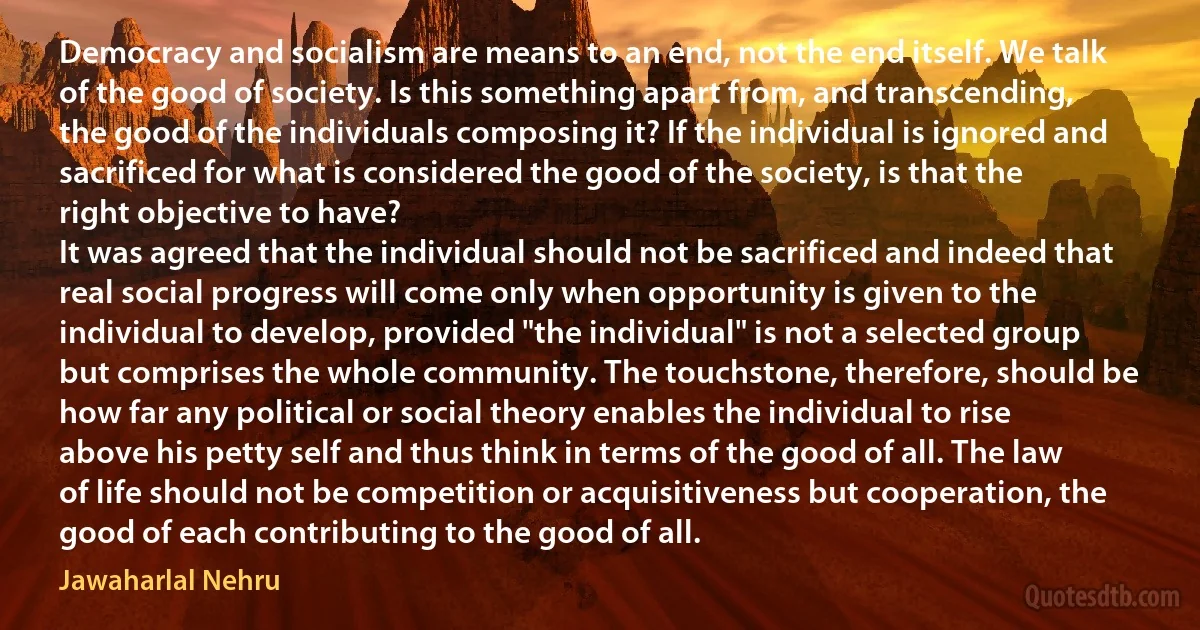
Democracy and socialism are means to an end, not the end itself. We talk of the good of society. Is this something apart from, and transcending, the good of the individuals composing it? If the individual is ignored and sacrificed for what is considered the good of the society, is that the right objective to have? It was agreed that the individual should not be sacrificed and indeed that real social progress will come only when opportunity is given to the individual to develop, provided "the individual" is not a selected group but comprises the whole community. The touchstone, therefore, should be how far any political or social theory enables the individual to rise above his petty self and thus think in terms of the good of all. The law of life should not be competition or acquisitiveness but cooperation, the good of each contributing to the good of all.
Jawaharlal NehruRelated topics
above acquisitiveness apart composing end far given good law life objective opportunity real right rise self should something talk think thus meansRelated quotes
Man may be excused for feeling some pride at having risen, though not through his own exertions, to the very summit of the organic scale; and the fact of his having thus risen, instead of having been aboriginally placed there, may give him hopes for a still higher destiny in the distant future. But we are not here concerned with hopes or fears, only with the truth as far as our reason allows us to discover it. I have given the evidence to the best of my ability; and we must acknowledge, as it seems to me, that man with all his noble qualities, with sympathy which feels for the most debased, with benevolence which extends not only to other men but to the humblest living creature, with his god-like intellect which has penetrated into the movements and constitution of the solar system - with all these exalted powers - Man still bears in his bodily frame the indelible stamp of his lowly origin.

Charles Darwin
In 1946, a Macy Foundation interdisciplinary conference was organized to use the model provided by "feedback systems," honorifically referred to in earlier conferences as "teleological mechanisms," and later as "cybernetics," with the expectation that this model would provide a group of sciences with useful mathematical tools and, simultaneously, would serve as a form of cross-disciplinary communication. Out of the deliberations of this group came a whole series of fruitful developments of a very high order. Kurt Lewin (who died in 1947) took away from the first meeting the term "feedback". He suggested ways in which group processes, which he and his students were studying in a highly disciplined, rigorous way, could be improved by a "feedback process," as when, for example, a group was periodically given a report on the success or failure of its particular operations.

Margaret Mead
Third Theory.-According to this theory, there is nothing in the whole Universe... that is due to chance; everything is the result of will, intention, and rule. It is a matter of course that he who rules must know. The Mohametan Ashariyah adhere to this theory, notwithstanding evident absurdities implied in it. ...The Ashariyah were therefore compelled to assume that motion and rest of living beings are predestined, and that it is not in the power of a man to do a certain thing or to leave it undone. ...It follows also from this theory, that precepts are perfectly useless, since the people to whom any law is given... can neither do what they are commanded nor abstain from what they are forbidden. ...According to this theory, it must also be assumed that the actions of God have no final cause. All these absurdities are admitted by the Ashariyah for the purpose of saving this theory.

Maimonides
The chief distinction in the intellectual powers of the two sexes is shewn by man attaining to a higher eminence, in whatever he takes up, than woman can attain - whether requiring deep thought, reason, or imagination, or merely the use of the senses and hands. If two lists were made of the most eminent men and women in poetry, painting, sculpture, music, - comprising composition and performance, history, science, and philosophy, with half-a-dozen names under each subject, the two lists would not bear comparison. We may also infer, from the law of the deviation of averages, so well illustrated by Mr. Galton, in his work on 'Hereditary Genius,' that if men are capable of decided eminence over women in many subjects, the average standard of mental power in man must be above that of woman. ... Thus man has ultimately become superior to woman.

Charles Darwin
A final aspect of all open access orders is Schumpeter's notion of creative destruction, one of the most powerful descriptions of a competitive, open access economy. When Schumpeter wrote Capitalism, Socialism, and Democracy in the early 1940s, the economic theory of perfect competition among atomistic firms (i. e., firms too small to have market power) had come under sustained attack as unrealistic. Large and powerful economic organizations dominated the new economy, and their behavior did not match the textbooks. Despite this dominance, the economy produced historically unprecedented, sustained economic development. Schumpeter asked, How could large businesses that were supposed to choke off competition and growth nonetheless generate such spectacular productivity increases in a world that seemed ever more competitive?

Douglass North
